Lesson 2 Breakfast or lunch
新概念英语2LESSON2Breakfast or lunch

3.Why was the writer's aunt surprised?
【Key structures】生词和短语
感叹句(Exclamations)
以 what 开头的感叹句结构为:What+adj.+n.+(主语+谓语)! Eg:What an interesting play(it is)!多么有趣的一出戏! =How interesting the play is. How + adj+ 主语+谓语
Lesson 2 Breakfast or lunch? 第二课 早餐还是午餐?
Questions:
1.Do you get up early every day? 2.What time do you usually get up every day? 3.Do you find it easy or difficult to get up? 4. What do you usually have for breakfast?
2. What a wonderful garden(this is)! = ____________________________.
【Key structures】生词和短语
频率副词 • always 总是 • almost always;near always 几乎总是 • generally;normally; regularly;usually 一般说来,通常来说 • frequently;often 经常
4 v.(铃、电话等)响 (刺耳的) The telephone is ringing.
新概念英语二 Lesson 2

3. outside adj./ adv./ n./ prep. --- inside (反) e.g. It was dark outside. (adv.) The outside world is very exciting. (adj.) The outside of the room is painted white. (n.) Please wait outside the room. (prep.)
Cold!
What beautiful flowers they are !
How beautiful the flowers are !
a What 2. ______ __ busy man he is ! How busy ______ ______ the man is ! What a 3. ______ __ happy baby it is !
The early bird catches the worm.
New words and expressions
until ring prep. 直到
outside adv. 外面
v. (铃、电话等) n. 姑、姨、婶、 v. 重复
响
aunt 舅妈 repeat
Vocabulary 词汇部分
1. I am working as a teacher. 2. He is still sleeping.
感叹句
用来表示惊奇,愤怒,赞赏,喜悦等感情 两种常见结构: What + (a/an) + adj. + (n.) + (主 + 谓) How + adj./ adv. + 主 + 谓 e.g. What an awful/ a nice day ! How beautiful the picture is! How well she sings!
新概念第二册 Lesson 2-breakfast or lunch
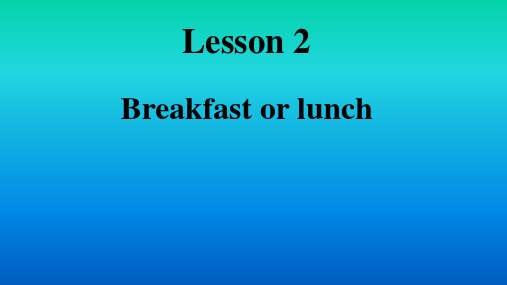
The early bird catches the worm.
Homework
1.熟记第2课的全部单词; 2.听录音30min, 熟读课文直至背诵;
Thank you See you next time.
感叹句
2.结构:
① How+adj./adv.+主+谓! eg. How clever the boy is! ② What+(a/an)+adj.+n.+主+谓! eg. What a clever boy he is! ③What+adj.+可n.复/不可n.+主+谓! eg. What cute puppies (these are)!
Language points
Last Sunday I got up very late. I looked out of the window. It was dark outside.
dark outside 外面黑
look out of the window
向外看
‘What a day!’ I thought.
同往常一样
as usual
日子不好过
have a difficult time
维持秩序
keep order
在这种场合
on these occasions.
Lead in
Breakfast + Lunch =
早午餐
New words & Expressions
until [ʌn'til] prep. 直到 outside ['aut'said] ad.外面 ring [riŋ] (rang[ræŋ] ,rung [rʌŋ] ) v.(铃、电话等)响 aunt [ɑ:nt] n.姑,姨,婶,舅妈 repeat [ri'pi:t] v. 重复
(完整版)新概念英语第二册第二课(包含课文、练习和答案)
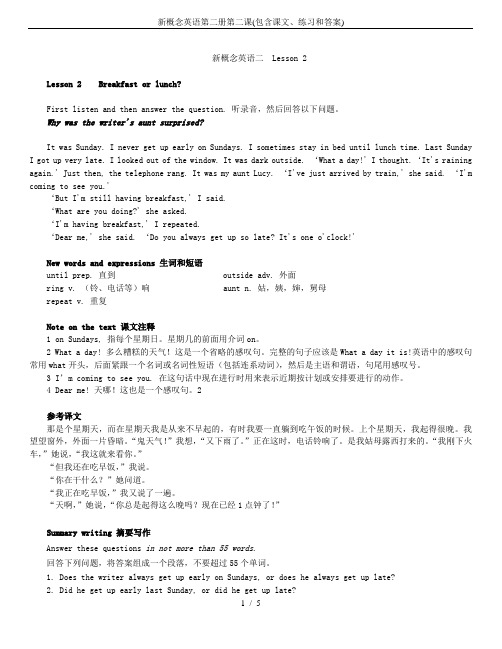
新概念英语二 Lesson 2Lesson 2 Breakfast or lunch?First listen and then answer the question. 听录音,然后回答以下问题。
Why was the writer's aunt surprised?It was Sunday. I never get up early on Sundays. I sometimes stay in bed until lunch time. Last Sunday I got up very late. I looked out of the window. It was dark outside. ‘What a day!' I thought.‘It's raining again.' Just then, the telephone rang. It was my aunt Lucy. ‘I've just arrived by train,' she said. ‘I'm coming to see you.'‘But I'm still having breakfast,' I said.‘What are you doing?' she asked.‘I'm having breakfast,' I repeated.‘Dear me,' she said. ‘Do you always get up so late? It's one o'clock!'New words and expressions 生词和短语until prep. 直到 outside adv. 外面ring v. (铃、电话等)响 aunt n. 姑,姨,婶,舅母repeat v. 重复Note on the text 课文注释1 on Sundays, 指每个星期日。
新概念2--lesson-2-Breakfast-or-lunch讲解

I stay in bed until twelve o'clock. (translate) I didn't get up until 12 o'clock.
2. outside (1) n. the outside of the house (2) adj. 外面的,外来的 an outside toilet 户外厕所 outside help外来的帮助 (3) adv. 在外面 It was dark outside. Please wait outside. (4) prep. It’s outside my business. 这不关我的事。 (5) 反义词: inside n./adj./adv./prep. (6) outsider: n 局外人
Filling: Five-nuts Red bean paste Lotus seed paste Salted duck egg yolk
Review
Go to the theatre Take a seat//be seated Interesting/interested/boring Behind//in front of Loudly/quietly Be angry with//angrily Rudely//politely Hear Turn round//turn around Pay attention to// pay no attention In the end None of your business//mind your own business Private conversation
got up very late. I looked out of the window. It was dark outside. “What a day!” I thought. “It’s raining again.” Just then, the telephone rang. It was my aunt Lucy. “I’ve just arrived by train,” she said. “I’m coming to see you.”
逐句精讲新概念英语第二册第二课早餐还是午餐?
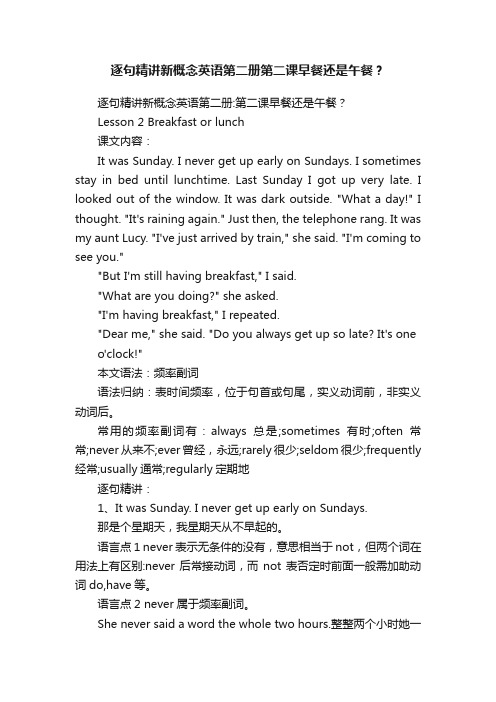
逐句精讲新概念英语第二册第二课早餐还是午餐?逐句精讲新概念英语第二册:第二课早餐还是午餐?Lesson 2 Breakfast or lunch课文内容:It was Sunday. I never get up early on Sundays. I sometimes stay in bed until lunchtime. Last Sunday I got up very late. I looked out of the window. It was dark outside. "What a day!" I thought. "It's raining again." Just then, the telephone rang. It was my aunt Lucy. "I've just arrived by train," she said. "I'm coming to see you.""But I'm still having breakfast," I said."What are you doing?" she asked."I'm having breakfast," I repeated."Dear me," she said. "Do you always get up so late? It's one o'clock!"本文语法:频率副词语法归纳:表时间频率,位于句首或句尾,实义动词前,非实义动词后。
常用的频率副词有:always总是;sometimes有时;often常常;never从来不;ever曾经,永远;rarely很少;seldom很少;frequently 经常;usually通常;regularly定期地逐句精讲:1、It was Sunday. I never get up early on Sundays.那是个星期天,我星期天从不早起的。
新概念英语2 Lesson 2 Breakfast or lunch课件讲解

The room ________ with laughter(笑声) of happy children.
A. listened B. rang C. heard D. repeated
I am afraid the same tragedy(悲剧) of yours will ______ itself.
‘But I'm still havijnugsbtretahkefans:t,就’ I s在aid那. 时 如果不知道对方性别, 他/她
Lesson 2 Breakfast or lunch?
词汇
until
I sometimes stay in bed until lunchtime prep. 直到 until前的状态一直持续到until 后的时间!
Tom玩电脑游戏一直玩到他妈妈回来。 Tome played computer games until his mother comeback. 直到听到闹钟(alarm clock)的铃声我才醒过来(wake up )。 I didn’t wake up until I heard the alarm clock. 直到他妈妈回来,他才开始做作业。 He didn’t do homework until his mother came back
在表达卧床时bed前不需加冠词: ‘But I'mIts’stiltl ihmaveinfgobrrebaekfdasnt,o’ Iwsa. id. ‘What aYroe uyomu duosintgs?’tsahye/arsekmed.ain in bed for
新概念2 Lesson2 Breakfast or Lunch

“But I’m still having breakfast,” I said. “What are you doing?” she asked. “I’m having breakfast.” I repeated. “Dear me,” she said. “Do you always get up so late? It’s one o’clock!”
考场实戓
• ( 2008 北京朝阳区中考) • Mid-autumn Day usually _______ in September or October every year. A. come B. comes C. is coming D. will come
• (2008 武汉中考) • - Can your father drive? - Yes, and he often _______ to school. A. drove B. is driving C. drives D. has driven
3. Last Sunday I got up very late. I looked out of the window.
look out of 向外看 look out 小心 look up 查(字典) look after 照顾 look for 寻找 look into 调查
4. It was dark outside. “What a day!” I thought. “It’s raining again.”
I did not leave until my sister came back. 直到我妹妹回来我才走。
用not…until(直到…才)改写 He died after the nurse left. He didn’t die __________until the nurse left. Lucy married in 2001. didn’t marry Lucy _____________ until 2001. Tom went to the cinema after school was over. Tom didn’t go to the cinema until school was over.
新概念II lesson 2 breakfast or lunch
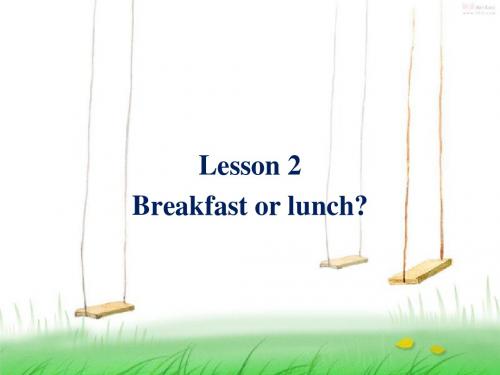
频度副词一般放在主语之后, 实义动词之前 如果是be动词,放在be动词之后 He is often late for school.
Present continuous tense现在进行时
• 构成:主语+am/ is/ are + 现在分词 • 功能: • ⑴ 表现在正在进行的动作。 I‟m still having breakfast. I am reading in bed now. • 现在分词的变化: ①+ing; play-playing study-studying; ②动词以e结尾,去e再加ing take-taking make-making; ③重读闭音节,双写尾字母再加ing run-running
Байду номын сангаас
5. What a day! • what开头的感叹句 (exclamations) What +a/ an +(adj形容词. )+ n名词 What a fool! • 真是个傻瓜! • What a shame! • 真可耻! • What a beauty! • 好个美女!
5. 乘坐交通工具 by train /bus /taxi by plane /air on foot 步行
2. I never get up early on Sundays. • on Sundays 每逢周日, 与一般现在时连用,表经常性的行为
3. look out of the window 向窗外看 Look out! =Be careful! 小心
• • • • •
4.I sometimes stay in bed until lunchtime. = I sometimes do not get up until lunchtime. stay in bed 卧床 go to bed睡觉 --- get up起床 stay up熬夜
NCE 2 Lesson 2 Breakfast or lunch 早餐还是午餐

NCE 2 Lesson 2 Breakfast or lunch? 早餐还是午餐?0.breakfast 早餐lunch 午餐luncheon 午餐supper 晚餐dinner 正餐meal 一餐brunch 早中餐1.It was Sunday. 那是个星期天。
it指时间、天气、温度或距离,it被称为“虚主语”(empty subject),作为第三人称单数的中性代词,it可以指一件东西、一件事件或用来指是什么人。
It is a lovely baby. 是一位可爱的婴儿。
2.I never get up early on Sundays. 星期天我从来不早起。
I go to the library on Monday afternoons. 我每个星期一下午都要去图收馆。
非实义动词: 1.系动词(be)2.助动词【帮助动词构成时态的】(do,does,will,shall,have,has,had)3.情态动词(must,can,may)除此之外都是实义动词。
频率副词往往放在句子中间, 实义动词前, 非实义动词后。
如果既有实义动词又有非实义动词, 要放在两个之间。
疑问句中副词往往放在主语后面。
英文中常用的频度的副词有never,sometimes,often,frequently,always,still,seldom,rarely等。
I’m never late for appointments. 我约会从来不迟到。
never 从来不Sometimes he tells us jokes. 有时候他给我们讲笑话。
sometimes 有时候We often meet at that coffee shop. 我们经常在那家咖啡馆见面。
often 经常Our teacher frequently collects our exercise book. 我们的老师经常收我们的作业本。
frequently 频繁地She is always nice and friendly to people. 她对人总是那么友好友善。
新概念二册lesson 2

Lesson 2 Breakfast or lunch 早餐还是午餐一词汇拓展brunch n 早午餐nephew n 侄子,外甥niece n 侄女,外甥女cause v 引起,使遭受not.......until 直到.......才Eg; I didn’t get up until 10 o’clock.二短语ring sb=call sb=give sb a ring 给某人打电话be surprised at sth 对某事惊讶be surprised to do 对做某事惊讶never=助动词+not 从来不arrive at+小地点arrive in +大地点get up early 早起stay up late 熬夜stay in bed 呆在床上look out of 向外看Just then=at that moment 就在那时by train乘火车by sea 乘船by air 乘飞机by taxi乘出租车表示交通方式的时候用by 直接加交通工具,不加冠词强调动作本身用take加冠词,在加工具本身。
take a train take a bus/take a cartake a plane take a shipsometimes(有时) some times(几次几倍)sometime(在某个时刻)some time (一段时间)三语法it指时间、天气、温度或距离,也可以指一件东西、一件事件或用来指是什么人,被称为虚拟主语。
always 总是> often=usually 经常> sometimes 有时候> seldom 偶尔> hardly几乎不> never从不(频率副词用在be后实前)感叹句通常有what, how引导,表示赞美、惊叹、喜悦、等感情。
What + (a / an) + 形容词+ 名词+ (主语+ 谓语)What + 形容词+ 可数名词复数+ 其他What + 形容词+ 不可数名词+ 其他How + 形容词+主+谓+···!How + 形容词+a / an+ 名词+主+谓+···!进行时态be coming ,表示将来,表示近期按计划或安排要进行的动作。
(完整word版)新概念第二册Lesson2Breakfastorlunch详解
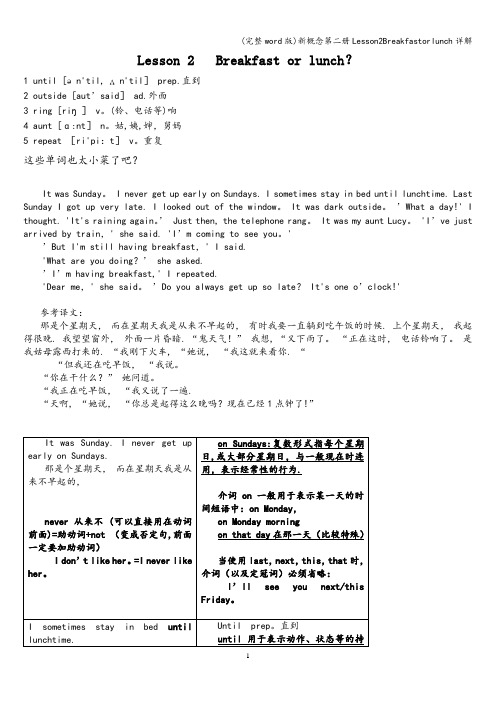
Lesson 2 Breakfast or lunch?1 until [ən'til, ʌn'til] prep.直到2 outside [aut’said] ad.外面3 ring [riŋ] v。
(铃、电话等)响4 aunt [ɑ:nt] n。
姑,姨,婶,舅妈5 repeat [ri'pi:t] v。
重复这些单词也太小菜了吧?It was Sunday。
I never get up early on Sundays. I sometimes stay in bed until lunchtime. Last Sunday I got up very late. I looked out of the window。
It was dark outside。
’What a day!' I thought. 'It's raining again。
’ Just then, the telephone rang。
It was my aunt Lucy。
'I’ve just arrived by train,' she said. 'I’m coming to see you。
'’But I'm still having breakfast,' I said.'What are you doing?’ she asked.’I’m having breakfast,' I repeated.'Dear me,' she said。
’Do you always get up so late? It's one o’clock!'参考译文:那是个星期天,而在星期天我是从来不早起的,有时我要一直躺到吃午饭的时候. 上个星期天,我起得很晚. 我望望窗外,外面一片昏暗. “鬼天气!” 我想, “又下雨了。
新概念 第二册 Lesson 2 Breakfast or lunch (自带课文视频和听力)

Grammar 现在进行时
形式:__a_m__/_i_s_/_a_r_e__+__d__o_i_n_g___
表示说话时正在进行的动作。 e.g. He is watching TV now.
5. It was my aunt Lucy. ‘I’ve just arrived by train,’ she said. ‘I’m coming to see you.’
词组:by train表示交通方式,放在 __句__末___
翻译:我坐公交车去上班。 __I _g_o__t_o__w__o_r_k__b__y__tr_a_i_n_.__
New words and expressions
1. until [ʌnˈtɪl] prep. 直到 2. outside [ˌaʊtˈsaɪd] adv. 外面 3. ring [rɪŋ] v. (铃,电话等)响 4. aunt [ɑːnt] n. 姑,姨,婶,舅母 5. repeat [rɪˈpiːt] v. 重复
长啥样? be + doing?
时间状语: _n_o__w__/__a_t_p__r_e_s_e_n__t_/__a_t_t_h__e__m__o_m__e__n_t_/__l_o_o_k__/__l_is_t_e_n__
翻译:宝宝正在睡觉。 ___T_h__e__b_a_b__y__is__s_l_e_e_p__in__g_.__
2. outside adv. 外面
反义词: __in__s_id__e__ e.g. Please wait outside.
新概念英语第二册课件-(lesson-2-Breakfast-or-lunch)(29张)(共29张PPT)

7. Was his aunt very surprised or not ?
Exercises
I am looking out of my window. I can see some children in the street. The children ______ (play) football. They always ______ (play) football in the street. Now a little boy ______ (kick) the ball. Another boy ______ (run) after him but he cannot catch him.
介词on一般用于表示某一天的时间短语中 on that day 在那天
on on Monday morning在星期一上午 on September 11,2010
所有的星期天,每逢星期天
Sundays
I often go shopping on Sundays. He sometimes swims on Sundays.
★ It was Sunday.那是个星期天
It
被
It is hot today.今天挺热的。
称
为
It is 12 o’clock now.现在12点。
虚
主
It is me.是我。
语
it指时间、天气、温度或距离,也可以指 一件东西、一件事件或用来指是什么人 。
★ I never get up early on Sundays
新概念英语第二册 lesson2 Breakfast or lunch解析

I never get up early on Sundays. on sundays 每个周日 频度副词(运用在动词左右,实前系后) sometimes 句首、句中、句尾 He is always late./He always comes late He is often late./He is late often. 对于频度副词的提问 How often do you go to the gym?
it.
outside 外面 play outside 课单独使用,也可接名词 反义词: inside 短语: outside help 外援 outside and in 里里外外
ring[rɪŋ]v.铃响,给某人打电话(rang rung) 1.ring sb (美式:call)give sb a ring 2.电话响 The telephone rings/The doorbell rings 3.ring finger 无名指 thumb /index finger/middle finger/little finger
How nice you are! How+形容词+谓语动词!(How nice)
e.g.
It is a lovely day today!
What a lovely day it is! They are wonderful actors.
How lovely it is!
What wonderful actors they are!
How wonderful the actors are!
He is a hard-working man.
What a hard -working man he is!
- 1、下载文档前请自行甄别文档内容的完整性,平台不提供额外的编辑、内容补充、找答案等附加服务。
- 2、"仅部分预览"的文档,不可在线预览部分如存在完整性等问题,可反馈申请退款(可完整预览的文档不适用该条件!)。
- 3、如文档侵犯您的权益,请联系客服反馈,我们会尽快为您处理(人工客服工作时间:9:00-18:30)。
5. ‘I’ve just arrived by train,’ she said. ‘I’m coming to see you.’
1. be coming 现在进行时表示按计划或安排要 进行的活动 类似的词语:go ,come, arrive, leave, start, have, take They are leaving tomorrow. I’m starting piano lessons soon.
一般现在时:表示日常习惯性的活动。
与之连用的时间副词: always usually often, frequently sometimes seldom,rarely ever never
1. We frequently have lunch at this restaurant. 2. He rarely gets up before 10 o’clock. 3. Do you ever read in bed?
3. ‘ What a day!’ I thought. ‘It’s raining again.’
感叹句 What +名词短语(+主语+ 动词)! How +形容词(+主语+ 动词)! It is an (awful) day. What an (awful) day it is! How awful the day is. It is an interesting book.
ห้องสมุดไป่ตู้
1. on Sundays 指每一个星期日 on Sunday 指在周日 on +具体的某日或某日的早、午、晚 在五月一日 on May 1st 在五月一日的早晨 on the morning of May 1st
I sometimes stay in bed until lunchtime.
4. Just then, the telephone rang. It was my aunt Lucy.
1. 正在那时 just then = at that moment 2. ring –rang-rung 给某人打电话 telephone sb call sb ring sb 我打电话给我的朋友们,让他们来一起学习。 I rang my friends to study together.
现在进行时:说话的时候动作正在进 行。或一段时间内的动向。
构成:主语+am, is, are +动词的现在分词 与之连用的词:still, now, at the moment. Look! Listen! John is still sleeping. She is watching TV at the moment. Mrs. Smith is cooking now. It’s 9 o’clock. The children are having classes. Jack is working hard these days.
Lesson 2 Breakfast or lunch
New word and expressions:
until prep. 直到 outside adv. 外面 ring (rang, rung) v. (铃,电话等)响 aunt n.姑,姨,婶,舅母 repeat v.重复
1. It was Sunday. I never get up early on Sundays.
1. stay in bed 躺在床上 in bed (人)在床上 Don’t eat in bed. on the bed (物)在床上 My coat is on the bed. 2. until 直到 咱们等到雨停吧。 Let’s wait until the rain stops. not… until 直到…才 He doesn’t go to bed until he finishes his homework.
6. ‘But I’m still having breakfast,’ I said. ‘What are you doing?’ she asked. ‘I’m still having breakfast,’ I repeated. ‘Dear me!’ she said. ‘Do you always get up so late?’ ‘It’s one o’clock.’
2. Last Sunday I got up very late. I looked out of the window. It was dark outside.
te 形副同形 They arrived home early yesterday. The boy runs fast. They worked very hard. Thank you very much. He swam very well this afternoon. 2. look out of 向外看 look out 当心
